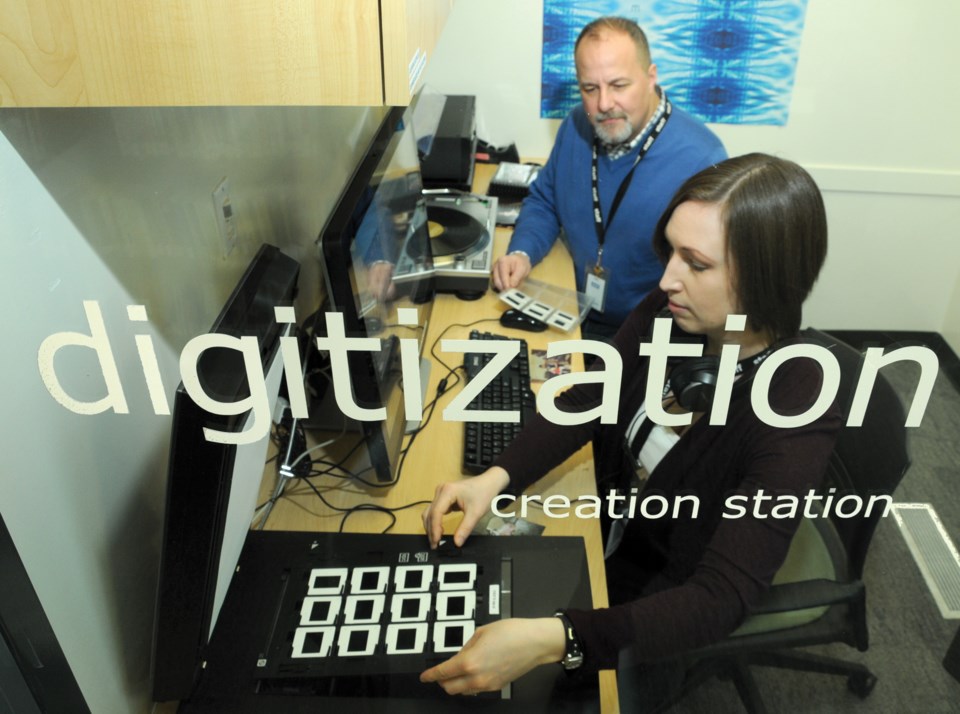So, you have stacks of home videos documenting everything from family vacations to high school reunions and children's birthday parties, but your VHS player bit the dust in the late-'90s and you haven't watched those tapes in 20 years.
Good news: old and obsolete media storage - including VHS tapes - can be digitized, so you can revisit those cherished (or cringeworthy) moments and share them far and wide.
To help people preserve the contents of outdated media, North Vancouver City Library is opening a digitization station on its third floor on Jan. 27.
Supported by private fundraising, the station is equipped with a computer and special software and hardware that will allow library patrons to convert all manner of old media - vinyl records, eight-tracks, audio cassettes, CDs, et cetera - into a digital format. The station also has an advanced flatbed scanner that will convert 35mm slides, film strip negatives, photographs and paper documents, such as old letters.
"This is a really practical service for the library, helps us do a little education around technology, and starts people on the process of learning how to become their own curators of their own memories," says Christopher Koth, head of digital services.
The digitization station is the first in the library's upcoming suite of "creation stations" that will eventually include 3-D printing, video production, audio recording, graphics and e-book making, funding permitting. These are all meant to fulfill the North Shore community's desire for better access to technology training, Koth says.
"The idea is that it's all about story-making and storytelling and story-sharing."
Library staff, including Koth, have been trying out the new equipment by digitizing old technology and documents found in their own homes.
"I'm embarrassed to say, I have some disco records that are just not available on iTunes, and quite frankly shouldn't be," he says with a laugh.
Meanwhile, head of collections Walter Zicha successfully digitized an important piece of family history.
"He's been hanging on to this very fragile, wilting, about-to-fall-apart recipe book from a great-great-grandmother. He's the only one in his family spread across Canada, the U.S. and Europe that has this and it's really a significant piece for their family," Koth says. After scanning the pages, Zicha was able to enlarge the text enough to be translated and shared.
"That's kind of incredible that this family artifact is now going to be able to be shared amongst all these different people, literally all over the world," Koth says.
Photographs, letters and record collections can have huge sentimental value and digital copies need not replace the originals, but the process of digitization can help to preserve fragile media by providing a second copy.
After all, vinyl records get scratched, photographs fade and cassette tapes wear out with extended play.
"So there's different vulnerabilities to traditional analog media that digitization helps to avoid," Koth says. "Not that digitization is perfect, but it at least helps you have an alternative capture."
Digital formats are also far easier to transport and share. Gone are the days of carrying a milk crate full of 78s to a friend's house (although vinyl has certainly been enjoying a renaissance in recent years).
Koth says the new digitization station is all part of the library's commitment to digital literacy training.
"We recognize that information is not just something that people can access through books and so on, that it's being created and collaborated on and shared and transferred through digital media," he says, "If we don't give people the opportunity and the exposure to seed an interest in that, they're going to be sort of left behind."
To use the digitization station, library customers will need to schedule an orientation before booking time in the station to work on their projects independently. Visit nvcl.ca or call 604-998-3450 for more information.



